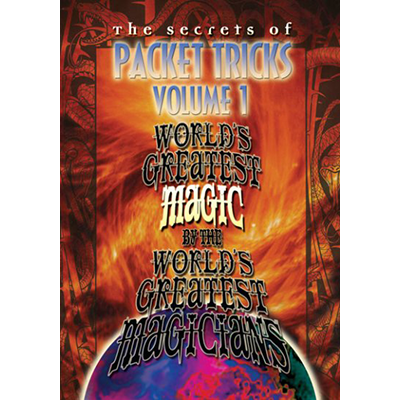The Secrets of Packet Tricks (World’s Greatest Magic) Vol. 1 video DOWNLOAD Murphy’s Magic Supplies, Inc.
$ 24,95 $ 14,97
It seems to be commonly believed that the genre of card magic known as packet tricks – that is, card tricks that use a small number of cards rather than the entire deck – are a relatively recent invention in the history of conjuring but this is not the case. While it’s true that packet tricks became insanely popular in the magic community of the 1960s and 70s (Jon Racherbaumer even coined the word “packeteer” to describe magicians who specialized in these types of tricks), effects with a small number of cards date back to the late 1800s. Though many use the term “packet trick” disparagingly, the truth is that, if well-conceived and performed, they can often be more astounding than effects performed with an entire deck of cards. Don’t underestimate the power of the packet! Armed with just a small bunch of cards and the wisdom gleaned from the masters on this download, you’ll be a “packeteer” in no time!
On Volume 1, you’ll meet a number of magicians performing and explaining small-packet card magic that any close-up performer would be proud to add to their repertoire. Larry Jennings starts with a trick that uses only three cards yet produces a remarkable visual illusion of one of the cards melting effortlessly through the other two. Martin Nash follows with a four-card trick where two Queens and two Jacks turn into four Queens and then four Jacks – that is, until they finally change into four Aces! Then, Michael Close shows off four blue-backed Jokers that turn red-backed one at a time and then instantly return to their original blue-backed condition while Michael Ammar performs and teaches a brilliant swindle with three blank-faced cards and an Ace – or so it appears. Next, the legendary Alex Elmsley offers a demonstration of the trick (and the sleight) that arguably started the modern packet trick era while Bill Malone twists some Aces and then turns them into something totally different. John Guastaferro combines two wonderful effects that combine the best features of the Hofzinser Four-Ace Problem and Paul Harris’ Reset while Darwin Ortiz rounds out the volume with his version of Peter Kane’s classic Ace transposition trick.
Fast shipping and professional packing
Because of our long-standing relationship with UPS FedEx DHL, and other major global carriers, we are able provide various shipping options. Our warehouse personnel will pack each item according to our strict specifications. Prior to shipping the goods are thoroughly inspected and secured. Every day we ship hundreds of packages to our customers across many countries. The fact that we're dedicated to becoming the largest online retailer in the world is evident. The warehouses and centers of distribution are in Europe and the USA.
Note that orders containing more than one item are processed according to the particular item.
We will inspect each and every one of the products before they are shipped. Today, the majority orders will be shipped within 48 hours. The delivery time will be between 3-7 working days.
Returns
The stock market is always changing. It's not entirely managed by us, since we are involved with multiple organizations, such as the factory and the storage. The actual levels of stock can change at any time. Please understand it may happen that your order is out of stock when the order has been placed.
Our policy runs for a period of 30 days. However, if the 30 days have elapsed from the date you purchased the product, we are unable to give you a refund or exchange.
For your item to be eligible for return, it must be unopened and in the condition you received it in. It should also be in the original packaging.




































